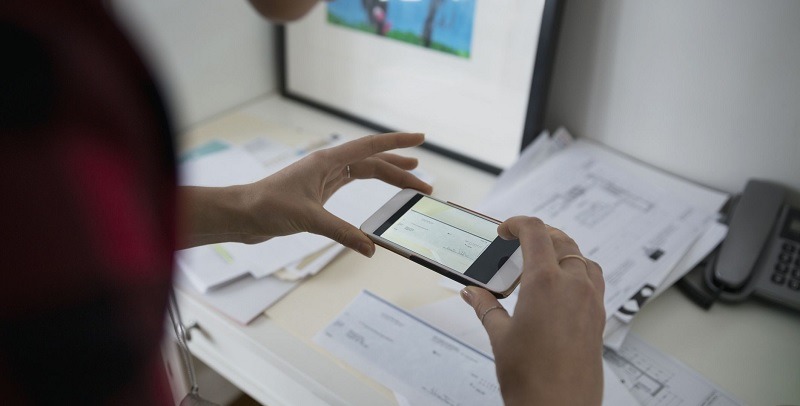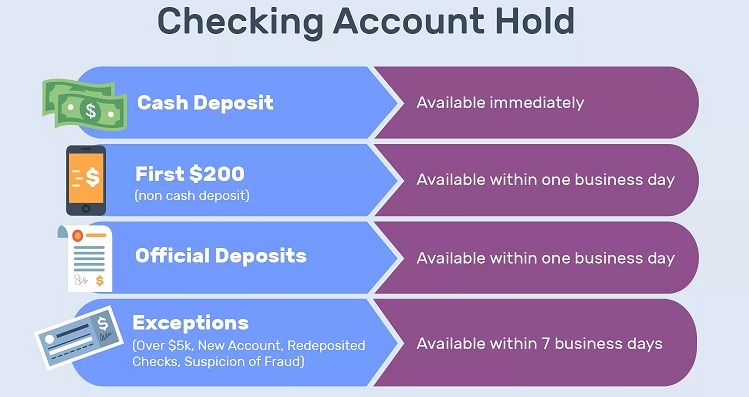
Have you ever deposited money into your checking account and found out that you can’t use it right away? This happens because banks often place “holds” on your deposits, preventing you from accessing your funds right away.
This results in you possibly bouncing checks or having issues with automatic payments. Continue reading to learn more about checking account holds, how to prevent, and how to remove them.
What Is a Hold?
A hold is simply a temporary delay in making funds available. Essentially, the bank will freeze your funds so that you can’t withdraw any money or use that money for electronic payments. However, your funds will still appear in your account.
If you check your account history, you’ll be surprised to see that the money that you’ve deposited actually shows up there. However, the money that you’ve added is deposited into your account balance, but not your available balance.
The keyword to focus on is “available”. What this means is your available balance is the amount of funds that you have ready to spend.
How Does the Bank Decide to Place a Hold on an Account?
If the check is large, or is from out of state, then there is a greater chance that the bank will put a hold on that check. The teller at the bank will try and call the location of where the check is issued from to see if the funds are available first.
On the other hand, smaller checks, checks that are in state, same bank as yours, fro m the U.S. Treasury, direct deposits, and cashier’s checks are normally available on the next business day.
Larger checks that exceed $5,000, redeposited checks, and those going into frequently overdrafted accounts will often have longer hold times. They do this sometimes if banks have “reasonable doubt’ on whether or not the check will clear. They will notify you if your account is placed on hold.
Keep in mind that when you’re dealing with funds in your checking account, the funds that show up in your account may not be part of your available funds. Always balance your checking account to make sure you don’t overspend.
Why Banks Hold Money
Contrary to popular belief, money doesn’t move as fast as people think, even electronic transfers. Whenever you deposit a money order or a check into your checking account, the bank will credit your total account balance immediately. However, your “available” balance is going to be different and the funds from the other establishment may take a couple days to transfer, and your bank may not know if the payment will clear.
Banks are sometimes concerned that checks written out to you could bounce, or those checks are fake. A hold on a deposit gives banks time to check for those issues. Basically, placing holds on deposits protects banks from losses for both you and the bank.
How Long Holds Last

On the other hand, sometimes banks won’t even place holds on any deposits you make, sometimes they are available right away. However, it is still common to see a hold on your account for a couple of business days. Additionally, the type of deposit is important in determining how long your hold lasts.
Banks are allowed to wait as long as they want when making your funds available. As mentioned above, they can either make your funds available immediately, or hold them for a couple of days to authenticate it. Don’t worry though, Federal Law limits how long banks can hold your deposits.
Cash Deposits
If you were to make a deposit in person to a bank employee, the funds must be made available within one business day. This is different from an ATM deposit that may last awhile longer. The rest of the rules below apply to non-cash deposits.
First $200
If you have a deposit that exceeds $200, then the first $200 of your deposit must be available within one business day. The remainder should be available by the second business day.
Official Deposits
These type of deposits are generally available within one business day. So, when you deposit more than $5,000 of checks in one day, the first $5,000 should be available within one day, but the rest may be on hold. Official deposits will include:
- Official bank checks such as cashier’s checks or certified checks
- Money orders issued by the United States Postal Service
- Checks issued by government organizations (such as a tax refund from the U.S. Treasury)
- Checks drawn on the same institution you make your deposit at
How to Remove a Hold
It’s frustrating when you aren’t able to spend your hard earned cash, but that is because of the policy that banks set. The computer system that manages all of the transactions follows a series of rules for all checks. It is possible to get a hold removed, but you must plead your case to your bank.
What Caused It?
There are multiple reasons as to why your deposit gets held. It can range from making a check deposit, which is subject to standard hold times. On the other hand, your funds might be frozen because you used your debit card at a place that requires preauthorization hold.
Ask to Have It Cleared?
If a merchant has placed a hold on your account through your debit card, you must contact the merchant for your funds to be released. It will take a couple of days for those holds to fall off, but be wary of hotels, rental cars, and gas pumps. If your bank places a hold on a personal check, you must call them to have it removed.
Wait It Out
In some cases, you won’t be able to do anything about a hold. Again, your bank needs to follow federal regulations and justify any holds in your account, so they can’t keep you from your money forever. If things go on for too long, contact the U.S. Consumer Financial Protection Bureau (CFPB) and file a complaint.
How To Prevent Holds
The easiest way to avoid holds on your account is to make deposits that are likely to become available to you quickly.
For your pay check, be sure to sign up for direct deposit. Electronic transfers, including one of this nature, normally clears much quicker than other transfers. This has the possibility of giving you access to your funds one or two days early. Some banks can accelerate these deposits, and you don’t need to physically deposit your paycheck to the bank.
For larger deposits, as for a form of payment that clears quickly. This includes:
- Wire transfers are often available within one day.
- Cashier’s checks, USPS money orders (but not other money orders), and certified checks can provide up to $5,000 within one business day.
Deposit your check to a bank employee. As mentioned above, if you deposit your check to a bank employee, it will take much less time to clear than through the ATM.
Deposit to a Separate Account. Having multiple checking accounts can help mitigate any issues you think your deposit might have. For example, if you’re making a deposit using a large out-of-state check, use an account that you don’t rely on everyday.
When using your debit card. Ask the merchant if they will place a hold on your account, and find out how much it will be. If the amount is large and you think it will cause problems, it’s probably best that you use a credit card or transfer extra money in the the checking account you’ll be using.
The Whole Account Is Frozen?
Sometimes, banks freeze your whole account—even cash that was at that point accessible in your record before making a significant deposit. Computer programs may decide (for an explanation that won’t be disclosed to you) that there’s a hazard and your assets should be frozen incidentally. Once more, a phone call may have the option to free up probably a portion of the cash.
The cash you can spend in your record is frequently called your accessible equalization. Inaccessible assets ought to show up under your held balance.
The most ideal approach to maintain a strategic distance from problems is to converse with a banker while you’re opening an account and making huge stores. Depict precisely how you intend to utilize the account: How frequently you’ll deposit and withdraw, the common size of exchanges, and the source of assets. A decent banker will perceive account features that will make you a content client.
After some time, your bank (and its computer systems) should get used to how you utilize your account. On the off chance that you travel or make deposits and withdrawals, the bank ought to know that you are not doing anything incorrectly and decrease the seriousness of holds in your account. Banks utilize complex risk scores and digital models to avert misrepresentation, and you have to prepare the bank on what’s in store in your account.
 |
 |
 |
 |
Bottom Line
After your hold ends, you are free to use your money again. Some takeaways from this post is that you make sure what type of deposits will most likely create a hold on your account. Such deposits include purchases at gas pump, rental cars, and hotels.
With this in mind, if you want more informational posts like this, check out our Bank Guides here on HMB!




Leave a Reply